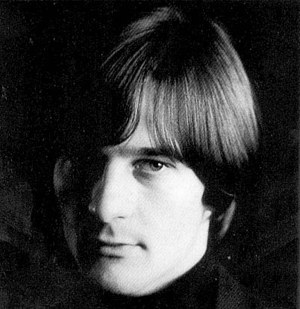
Gene Clark
Harold Eugene Clark (November 17, 1944[1] – May 24, 1991) was an American singer-songwriter and founding member of the folk rock band the Byrds.[2] He was the Byrds' principal songwriter between 1964 and early 1966, writing most of the band's best-known originals from this period, including "I'll Feel a Whole Lot Better", "She Don't Care About Time", "Eight Miles High" and "Set You Free This Time".[2] Although he did not achieve commercial success as a solo artist, Clark was in the vanguard of popular music during much of his career, prefiguring developments in such disparate subgenres as psychedelic rock, baroque pop, newgrass, country rock, and alternative country. He was inducted into the Rock and Roll Hall of Fame in 1991 as a member of the Byrds.
For other people named Gene Clark, see Gene Clark (disambiguation).
Gene Clark
Harold Eugene Clark
November 17, 1944
Tipton, Missouri, U.S.
May 24, 1991 (aged 46)
Sherman Oaks, California, U.S.
Musician, singer-songwriter
- Vocals
- guitar
- harmonica
- tambourine
1963–1991
Biography[edit]
Life[edit]
Clark was born in Tipton, Missouri, the third of 13 children in a family of Irish, German, and Native American heritage.[3] His family moved to Kansas City, Missouri, where as a boy he began learning to play the guitar and harmonica from his father.[4] He was soon playing Hank Williams tunes as well as songs by early rockers such as Elvis Presley and the Everly Brothers. He began writing songs at the age of 11.[5] By the time he was 15, he had developed a rich tenor voice, and he formed a local rock and roll combo, Joe Meyers and the Sharks.[6] Like many of his generation, Clark developed an interest in folk music because of the popularity of The Kingston Trio. When he graduated from Bonner Springs High School, in Bonner Springs, Kansas, in 1962, he formed a folk group, the Rum Runners.[7]
Documentary[edit]
A documentary about Clark's life and career, entitled The Byrd Who Flew Alone, was released in 2013, featuring contributions from family, friends, the three surviving original members of the Byrds, latter-day Byrd John York and late-era collaborators Carla Olson and Pat Robinson. The documentary revealed that Clark was suffering from throat cancer at the time of his death.[70]